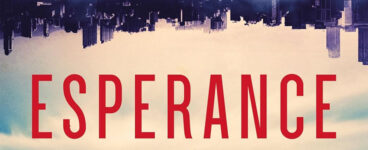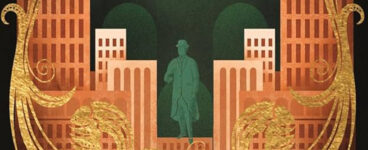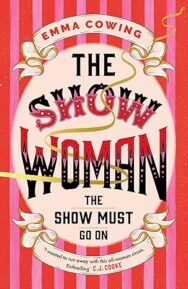A Q & A with Emma Cowing
‘Part of what drew me to writing about the world of Scottish showpeople is that it is hidden history, and as we know, women’s history itself is often hidden history.’
Emma Cowing’s debut novel The Show Woman is an beautifully-told, action-packed tale of the first all-female circus in Edwardian Britain. BooksfromScotland chatted to her about how the hidden stories from history should be brought out into the open.
The Show Woman
By Emma Cowing
Published by Hodder & Stoughton
Well done on publishing your debut novel, The Show Woman! How have you enjoyed your journey into publication so far?
Thank you so much! It has been a rollercoaster so far, but very much of the fun kind. I think what has surprised me most is how much of a team effort it is to publish a book. From cover designs to marketing plans, working with my brilliant editor Jo Dickinson at Hodder and the creative input that stretches across the publishing house, there’s so much that goes on behind the scenes to get every book you see in a bookshop on to the shelf. It’s been exciting, and very humbling!
What can readers expect from your novel?
Thrills, spills and all the fun of the fair as four young women come together in Edwardian Scotland to create the first all-female circus act. You’ll meet strong female characters striving to make their way in a man’s world, lions, elephants, and an adorable horse named Tommy Pony. At the heart of the story is a long-buried family secret that threatens to tear apart the Ladies Circus for good. You’ll also see quite a bit of Scotland along the way, as the circus travels from Glasgow’s Vinegarhill showground up to Aberdeen during the 1910 summer fair season.
The inspiration for The Show Woman came from a family member. Can you tell us more about that?
My great aunt Violet was a trapeze artist and bareback horse rider, and her parents were showpeople who traversed the fairgrounds of Scotland between the 1880s and the 1910s with their travelling theatre. Learning about their lives, partly through official documents (under profession, many of my female family members were described as ‘showwomen’) and partly from the family stories my Mum remembered from her childhood, was hugely inspiring. I knew I had to write about it.
Have you inherited any unexpected skill you can share with us?
I am the world’s least flexible person so definitely not the trapeze! However I am musical, as some of my great aunts and uncles were, and as a child played a tiny quarter size violin which was passed down to me from Violet’s brother. My family would also say I quite like telling people what to do, so perhaps, like the character of Lena in The Show Woman, I might be a good ringmistress…
Have you always been interested in women’s lives and status in history?
Absolutely. Women are so often relegated to the sidelines of history, and yet when you really delve into it they were front and centre, but their stories remained untold. Part of what drew me to writing about the world of Scottish showpeople is that it is hidden history, and as we know, women’s history itself is often hidden history. Combining those two factors was really interesting to me, and a tale I thought deserved to be told.
Other than the women in your family, do you have any other rebellious ladies you take inspiration from?
From Mary Queen of Scots to Agnes Randolph, Scotland has always had its fair share of rebellious women (I absolutely loved Mairi Kidd’s Warriors and Witches and Damn Rebel Bitches which covers this topic beautifully), and I’m always on the lookout for stories of women who dared to challenge the conventions of the day.
For my next novel, which is out in Spring 2026, I’m staying in the Edwardian period but delving into my husband’s family of Italian immigrants as well as the world of London’s Gaiety Theatre, where women took to the stage and became pinups at a time when the notion of celebrity was in its infancy. Most of the action takes place at a country house party on a Scottish island and I’ve had a lot of fun playing with societal structures and stereotypes, and what it meant to lead a fulfilling life as a woman at a time when we still didn’t have the vote. I think I’ll always be drawn to women who are outsiders.
Your day job is in journalism, so you’re used to writing to deadline. How was the switch to novel writing where you have more space, but you still have to balance this with structure and momentum?
It was definitely a shift. For a long time I was writing chapters the exact word length of the features I wrote in the day job. It was a bit of a process to understand that I had more freedom in novel writing, that a chapter could be as long or as short as I liked. It was a similar thing with structure and momentum. Once I realised I was in control, that it was my story and I could tell it exactly the way I wanted to, I absolutely revelled in the freedom.
What kind of novels do you enjoy reading?
I adore historical fiction, as you might imagine, and recent favourite reads include Kate Foster’s The King’s Witches, Stacey Halls’ The Household, Joanna Miller’s The Eights and Fiza Saeed McLynn’s The Midnight Carousel. All time favourites include The Cazalet Chronicles by Elizabeth Jane Howard and everything ever written by the peerless Sarah Waters.
What has been your favourite read so far this year?
There have been so many (2025 is shaping up to be such a great year for books), but my absolute stand out is Clare Leslie Hall’s Broken Country. A magnificent novel about first loves and heartbreaking loss with the pulse of a thriller. I couldn’t put it down.
The Show Woman by Emma Cowing is published by Hodder & Stoughton, priced £16.99.
ALSO IN THIS ISSUE

 Esperance: A Q & A with Adam Oyebanji
Esperance: A Q & A with Adam Oyebanji
‘If you think about it, a thriller is almost always dark. People are murdered, planes crash, buildin …

 Murray Hall by Milo Allan
Murray Hall by Milo Allan
‘Ah’d say Murray was one who lost a few lives along the way. So be it. Lives are made to be lost.’













